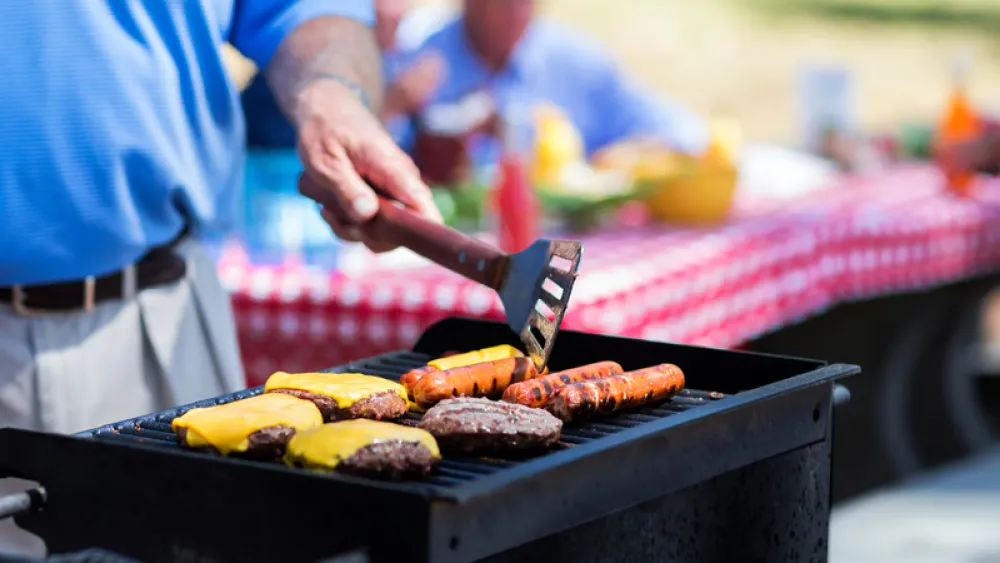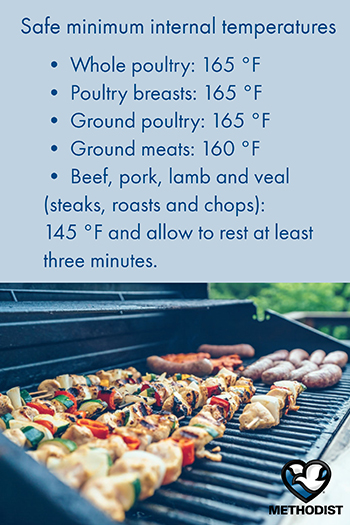Healthy Lifestyle
8 Tips for Keeping Your Summer Foods Safe
Published: June 21, 2019

In the summer, we talk a lot about the bugs that bite. But have you thought much about the bugs inside your favorite summer foods?
Outdoor picnics and grilling can be prime time for dangerous food-borne bacteria. The most common ones we see include:
They can cause food poisoning and result in illness, hospitalization and even death.
Staying healthy means taking a few extra precautions. Here are eight ways to keep your favorite summer foods safe:
1. Purchase cold foods last. Food safety begins before you even leave the store. When shopping, be sure to pick up foods that need refrigeration just before checkout to avoid warming. Go straight home and put them in the refrigerator right away. Freeze poultry and ground meat that won't be used in one or two days, and freeze other unused meats within four to five days. Never leave raw meat, poultry or any perishable food out at room temperature for more than two hours.
2. Keep meats separate from other foods. Always keep raw meats separated from other foods so harmful bacteria present in the juices doesn’t contaminate safely prepared foods. Be sure to thoroughly wash anything – plates, utensils, cutting boards and your hands – that come into contact with raw meat before touching anything else.
3. Thaw meats safely. To help your meats cook evenly, you’ll want to thaw them before putting them on the grill. Put them in the refrigerator for slow, easy thawing. If you plan to put the food on the grill right away and need it thawed more quickly, you can defrost it in the microwave.
4. Marinate foods in the refrigerator. Poultry and  cubed meat can sit in your favorite marinade for up to two days in the refrigerator. Steaks and cuts of beef, veal and pork can be marinated up to five days. If you plan to use some of the marinade as a sauce on the cooked food, be sure to save some before putting it on the raw meat. If you have to use marinade that has already been used on raw meat, boil it first to destroy any harmful bacteria.
cubed meat can sit in your favorite marinade for up to two days in the refrigerator. Steaks and cuts of beef, veal and pork can be marinated up to five days. If you plan to use some of the marinade as a sauce on the cooked food, be sure to save some before putting it on the raw meat. If you have to use marinade that has already been used on raw meat, boil it first to destroy any harmful bacteria.
5. Clean your grill surface. Before you grill any foods, preheat your grill on high heat for 15-20 minutes to kill any surface bacteria. After preheating, clean off charred debris from the grill rack using aluminum foil, a grill scraper or a grill brush. Be sure to carefully inspect the rack for any remaining debris. Scrape your grill again immediately after using it and wipe with a cloth if necessary.
6. Check your food’s temperature. One of the biggest offenders when it comes to food poisoning is foods that haven’t been cooked thoroughly. Because meats tend to brown quickly on the outside, the only way to know for sure if your food is done is to test the internal temperature with a food thermometer.
7. Keep hot foods hot. After grilling, keep food hot until it is served by setting it to the side of the grill rack, not directly over the coals where it can overcook. You can also keep it in a slow cooker or in a dish in the oven set on warm.
8. Keep cold foods cold. Keep perishable food and condiments cold in a cooler or refrigerator until serving time. While serving, cold foods can be kept in a shallow pan of ice, draining off water as it melts. For foods that should stay chilled, before sure to never keep them out longer than two hours. If temperatures outside are above 90 degrees, one hour is the max.
And we know those picnic foods are tasty, but remember, they won’t last forever. Eat any leftovers within three to four days, and discard anything after that. A great way to keep track is to write that date on any containers in your fridge.
If you do get food poisoning, your symptoms could include abdominal cramps, nausea and vomiting, diarrhea, headache or weakness. Be sure to get plenty of fluids and contact your Methodist Physicians Clinic provider.


